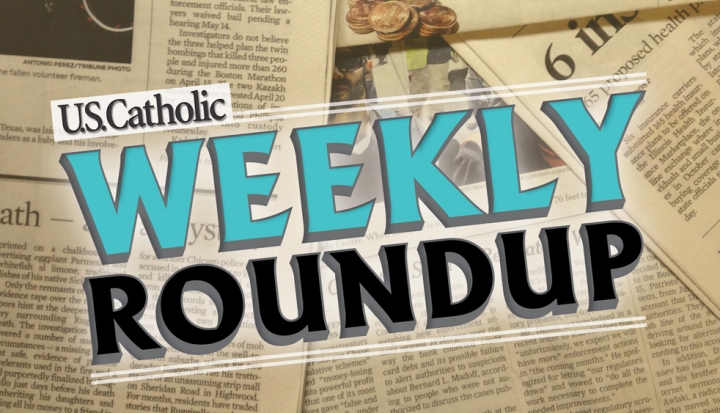It has been a busy week in the world. Here's a sampling of what happened this week:
There was diocesan conflict heard 'round the world. In Detroit, some parishoners are taking a stand in opposition to Archbishop Allen Vigneron's statement that Catholics who support gay marriage should abstain from communion. In Rio De Janeiro, one priest's liberal views proved too much, and he was excommunicated. Then in Rhode Island, where same-sex marriage was legalized on Thursday, Bishop Thomas Tobin wrote a letter to parishoners cautioning them that attending a same-sex wedding would compromise their faith.
On Thursday, amid some significant scandal, Father Michael Fugee of New Jersey resigned. Newark Archbishop John J. Myers accepted the resignation, but not before a spotlight of criticism was turned onto him for allowing a known sex offender to be involved with minors. (Read Nicholas Cafardi's commentary on the situation here.)
In New York, it was announced on Wednesday that the nuns are climbing back on the bus, where they will be touring in the name of comprehensive and just immigration reform. Last summer the "nuns on the bus" toured nine states, raising awareness about the plight of the poor.
Not to be overshadowed by nuns on a bus, the USCCB has announced that they are gearing up for a second round as well. The "Fortnight for freedom" will be making its second appearance from June 21 through July 4 this summer. Of particular focus is likely to be the August 1, 2013 deadline for employers to comply with the controversial HHS mandate. On our blog, Scott Alessi questions how effective this year's campaign will be.
In an effort to improve their image with women, the USCCB hired former Sarah Palin staffer Kim Daniels to be the spokesperson for USCCB President, Cardinal Dolan. It is assumed that Daniels meets the goal of hiring an "attractive, articulate, and intelligent" woman to represent the USCCB.
On Wednesday, the Supreme Court declined to hear Alabama's challenge to a court ruling tossing out much of the state's draconian immigration laws. The harsh laws were fought by Methodist, Episcopal, and Catholic bishops.
Clergy in Connecticut want legislators to raise the minimum wage to $9.75/hour to help struggling families earning minimum wage to ‘‘get a little closer to paying the bills.’’ (See Scott Alessi's commentary on Rhode Island's minimum wage laws here.)
Pope Francis spoke with harsh tones on Tuesday, which was International Workers Day as well as the feast of St. Joseph the Worker, when he railed against corporations who put profit ahead of fair wages and safe conditions of their workers. The Pontiff even took to Twitter, tweeting, "My thoughts turn to all who are unemployed, often as a result of a self-centered mindset bent on profit at any cost." Though the Holy Father's message resonated with many, there were a few who were "frustrated" with the criticism of corporations and capitalism.
Catholic governor of historically Catholic state Maryland signed into law a ban on capital punishment. The signing of this law came on the heals of an ABC/Washington Post poll which found that 70% of people would support the death penalty for Boston bombing suspect Dzhokhar Tsarnaev. Cardinal O'Malley of Boston, however, called for forgiveness and restorative justice over vengeance.
Thursday was the National Day of Prayer, which was established in 1952. (If you are looking for something to pray for, read Michael McCarthy's piece, "Saying a prayer for God's nonviolent love".)
In the United States, suicide rates are on the rise. In the U.K., though, a majority of most faith groups support assisted suicide as an appropriate way to end life.
At the Vatican this week, Pope Emeritus Benedict XVI returned to the Vatican, where he will reside in the small Mater Ecclesiae convent with his older brother, also a priest.
Also at the Vatican, some depictions of naked men with feathered head dresses were uncovered during the restoration of a Rennaissance era resurrection scene painted by Pinturicchio. The fresco had been so layered with soot that the scene was not visible. Now, the little scene is thought to be the earliest European representation of Native Americans, as the fresco dates to 1494.
And that's our weekly roundup. Have a blessed and safe weekend!








